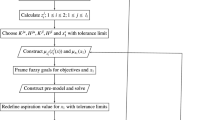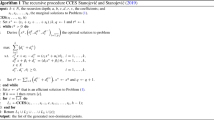Abstract
Theory and applications of fractional programming have been significantly developed in the few last decades and assignment problem is one of the fundamental combinatorial optimization problems in the branch of optimization. Generally, in real world problems, the possible values of coefficients of a linear fractional programming problem are often only imprecisely or ambiguously known to the decision maker, therefore, it would be certainly more appropriate to interpret the coefficients as fuzzy numerical data. In this article, a fuzzy bi-objective fractional assignment problem has been formulated. Here the parameters are represented by triangular fuzzy numbers and the fuzzy problem is transformed into standard crisp problem through \(\alpha \)-cut and then the compromise solution is derived by fuzzy programming.



Similar content being viewed by others
Change history
03 June 2019
In the original published article the “Conclusion and future scope” paragraph has been incorrectly published.
Notes
Triangular Fuzzy number (TFN) A fuzzy number \({\tilde{A}}=(p,q,r)\) is said to be a triangular fuzzy number if its membership function is given by
$$\begin{aligned}\mu _{{\tilde{A}}}=\left\{ \begin{array}{ll} \frac{x-p}{q-p} &{}\quad if\;\; p \le x \le q \\ \frac{r-x}{r-q} &{}\quad if\;\; q \le x \le r \\ 0 &{}\quad otherwise \\ \end{array} \right. \end{aligned}$$
References
Akkapeddi, S.M.: Fuzzy programming with quadratic membership functions for multi-objective transportation problem. Pak. J. Stat. Oper. Res. 11(2), 231–240 (2015)
Bellman, R.E., Zadeh, L.A.: Decision-making in a fuzzy environment. Manag. Sci. 17(4), B-141 (1970)
Charnes, A., Cooper, W.W.: Programming with linear fractional functionals. Naval Res. Logist. Q. 9(3–4), 181–186 (1962)
De, P.K., Yadav, B.: A general approach for solving assignment problems involving with fuzzy cost coefficients. Mod. Appl. Sci. 6(3), 2 (2012)
Dinkelbach, W.: On nonlinear fractional programming. Manag. Sci. 13, 492–498 (1967)
Gupta, R.: Decomposition method and transportation type problems with a fractional objective function. ZAMM-J. Appl. Math. Mech. (Zeitschrift fr Angewandte Mathematik und Mechanik) 57(2), 81–88 (1977)
Kar, S., Basu, K., Mukherjee, S.: Solution of generalized fuzzy assignment problem with restriction on costs under fuzzy environment. Int. J. Fuzzy Math. Syst. 4, 169–180 (2014)
Kumar, A., Gupta, A., Kaur, A.: Method for solving fully fuzzy assignment problems using triangular fuzzy numbers. World Acad. Sci. Eng. Technol. Int. J. Comput. Electr. Autom. Control Inf. Eng. 3(7), 1889–1892 (2009)
Kumar, P.S., Hussain, R.J.: A method for solving balanced intuitionistic fuzzy assignment problem. Int. J. Eng. Res. Appl. 4(3), 897–903 (2014)
Lin, C.J.: A simplex-based labelling algorithm for the linear fractional assignment problem. Optimization 64(4), 929–939 (2015)
Lin, C.J., Wen, U.P.: A labeling algorithm for the fuzzy assignment problem. Fuzzy Sets Syst. 142(3), 373–391 (2004)
Pandian, P., Kavitha, K.: A new method for solving fuzzy assignment problems. Ann. Pure Appl. Math. 1, 69–83 (2012)
Sadia, S., Gupta, N., Ali, Q.M.: Multiobjective capacitated fractional transportation problem with mixed constraints. Math. Sci. Lett. 5(3), 235–242 (2016)
Sakawa, M., Nishizaki, I., Uemura, Y.: Interactive fuzzy programming for two-level linear and linear fractional production and assignment problems: a case study. Eur. J. Oper. Res. 135(1), 142–157 (2001)
Saruwatari, Y., Shigeno, M., Matsui, T.: An algorithm for fractional assignment problems. Discrete Appl. Math. 56(2), 333–343 (1995)
Swarup, K.: Transportation technique in linear fractional functional programming. J. R. Naval Sci. Serv. 21(5), 256–260 (1966)
Acknowledgements
The author express their sincere thanks to editor and referees for their valuable suggestions and comments, which improved the quality of the paper.
Author information
Authors and Affiliations
Corresponding author
Additional information
Publisher's Note
Springer Nature remains neutral with regard to jurisdictional claims in published maps and institutional affiliations.
Rights and permissions
About this article
Cite this article
Gupta, N. Optimization of fuzzy bi-objective fractional assignment problem. OPSEARCH 56, 1091–1102 (2019). https://doi.org/10.1007/s12597-019-00367-2
Accepted:
Published:
Issue Date:
DOI: https://doi.org/10.1007/s12597-019-00367-2




